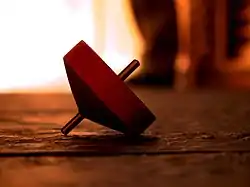юла
Russian
Etymology
Unknown. Theories include:
- Simplified from *вьюла́ (*vʹjulá) from вить (vitʹ)
- Related to юр (jur, “a spot stirred up by currents or bypassers etc.”), ю́ркий (júrkij, “agile, brisk”), Proto-Slavic *juriti (“to stir up”), Serbo-Croatian júriti (“to chivvy”), Polish jurzyć (“to stir up”), of Turkic origin represented by yürümek (“to march forward”)
- Related to Proto-Slavic *juditi, Polish judzić (“to instigate”)
- Borrowed from a descendant of Old Norse hjól (“wheel”)
Pronunciation
- IPA(key): [jʊˈɫa]
Noun

юла
юла́ • (julá) f inan or f anim (genitive юлы́, nominative plural юлы́, genitive plural юл)
- spinning top (toy)
- woodlark
Declension
Synonyms
- волчо́к (volčók)
- лесно́й жа́воронок (lesnój žávoronok)
Related terms
- юли́ть impf (julítʹ)
Further reading
- Vasmer, Max (1964–1973) “юла”, in Oleg Trubachyov, transl., Этимологический словарь русского языка [Etymological Dictionary of the Russian Language] (in Russian), Moscow: Progress
This article is issued from Wiktionary. The text is licensed under Creative Commons - Attribution - Sharealike. Additional terms may apply for the media files.